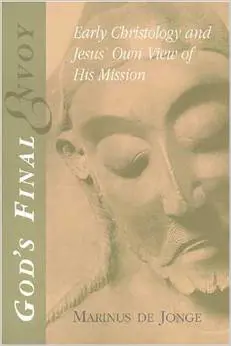

God's Final Envoy: Early Christology and Jesus' Own View of His Mission (Studying the Historical Jesus)
Pages
176
Publisher
Eerdmans
Published
2/18/1998
ISBN-13
9780802844828
Many have claimed to be able to present a startling new picture of Jesus. Yet, in spite of loud claims to the contrary, practically all we can know about him comes from the first three New Testament Gospels or can be inferred from statements in Paul's letters. In this intriguing study, Marinus de Jonge canvasses these earliest Christian responses to Jesus in an attempt to discover Jesus' own understanding of himself and his mission. Steering a middle course between skepticism and absolute confidence regarding the reliability and the usefulness of what we know about Jesus from the early Christian sources, de Jonge carefully distinguishes between what seems certain, probable, and possible, and he argues that though we cannot fill in all the details, it is possible to present a picture of what was most characteristic of Jesus.
Reviews
Marinus de Jonge is Professor Emeritus of New Testament and Early Christian Literature at the University of Leiden, the Netherlands. In the latter part of his distinguished career de Jonge focused more and more on questions of NT christology. His two most significant contributions have been Christology in Context: The Earliest Responses to Jesus (Philadelphia: Westminster, 1988), and Jesus, The Servant-Messiah (New Haven: Yale University, 1991) which grew out of his Shaffer Lectures for Yale (1989). The latter volume formed the subject of a symposium held at Leiden in January 1991 on the occasion of his retirement, during which his ideas were subjected to friendly critique by Henk Jan de Jonge, Wayne Meeks and Dieter Lührmann. These lectures were included in his Festschrift, edited by M. C. de Boer, From Jesus to John: Essays on Jesus and New Testament Christology (JSNTSupp 84; Sheffield: Sheffield Academic, 1993). By all accounts the in-house Dutch language debate seems to have been still more intense through the middle ’90s. It is important to appreciate this background to the present volume, since it provides de Jonge’s considered responses to that debate and further reflections on the subject occasioned by the debate. He has also been able to make use of and revise other christological studies running through the earlier ’90s. What we have then is not only the climax of de Jonge’s study in this area but a work of rare maturity of scholarship. This is signalled particularly by the measured quality and restraint of his judgments.
[Full Review]
God's Final Envoy is de Jonge's reconstruction of how Jesus characterized his purpose. As the title indicates, the bottom line will be that Jesus thought God sent him to announce the coming of the end of this age and the beginning of the age to come. De Jonge has made the same point in earlier publications. This book in fact reprints or reworks material from his 1991 Jesus the Servant Messiah as well as articles previously found in other collections of essays. As the author explains in his introduction, since Jesus the Servant Messiah is now out of print and since he wanted to participate in the current lively discussion about Jesus' understanding of his mission, he decided to put together this volume. De Jonge's arguments are a helpful counterweight to the tendency among some theologians and historians of Jesus and early Christianity to treat the resurrection as pixie dust, transforming the ordinary preaching of the historical Jesus into the exalted claims about him in the early church. Since the resurrection is by nature beyond historical inquiry and beyond rational explanation, it by default sometimes becomes an unhistorical and irrational transmogrifying machine: through the experience of the resurrection, "the proclaimer became the proclaimed." Poppycock, says de Jonge; Jesus not only talked about the Kingdom of God but also about his role in bringing it, and by "asking back" from the church's beliefs we can demonstrate this. In de Jonge's words: "We shall have to work backwards to the earliest responses to Jesus among his followers, and try to answer the question to what extent these may be traced to Jesus' own thoughts about his mission.
[Full Review]
